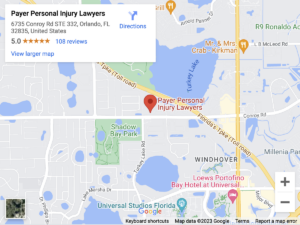Florida personal injury laws give injured parties the right to receive financial compensation for their injuries. They must prove the legal elements to hold the at-fault party responsible for their damages. Then, they can receive compensation for economic and non-economic damages.
Economic damages are the financial losses you experience because of an injury, such as one sustained in a truck or a car accident. They include your medical bills and expenses, loss of income, and out-of-pocket expenses.
However, the damages in a personal injury claim also include non-economic damages. These damages compensate you for your pain and suffering, among other consequences you may have experienced due to your injuries.
Even though these damages are intangible, you deserve fair and just compensation. Unfortunately, insurance companies tend to undervalue non-economic damages. Our personal injury lawyers at Payer Personal Injury Lawyers will help you recover a fair amount for your pain and suffering damages.
What Types of Damages Are Included in Non-Economic Damages in Orlando Personal Injury Cases?

There are several categories of non-economic damages. Examples of non-economic damages include:
Emotional Distress and Mental Anguish
An accident or personal injury can cause extreme anxiety, depression, stress, and other psychological conditions. Medical treatments and rehabilitation can add to the stress and trauma of an injury or accident.
Physical Discomfort
Injuries can cause overwhelming physical pain. Medical treatments can add to the pain and suffering.
Depending on the type of injury, a victim may suffer chronic pain for months or years. Some injuries can cause lifetime pain.
Disfigurement and Scarring
Injuries can result in amputations, disfigurements, and scarring. This type of injury can result in extreme emotional distress.
Permanent Impairments and Disabilities
Many accident injuries have the potential to cause life-long impairments. Spinal cord injuries can cause paralysis. A head injury could cause permanent brain injuries.
The cost of caring for someone with a permanent impairment could total millions of dollars over a lifetime. Likewise, disabling conditions could prevent someone from working for the rest of their lives.
Diminished Quality of Life and Loss of Enjoyment of Life
Accidents and injuries can decrease a victim’s quality of life. They may not be able to enjoy the same types of activities they did before the accident. The inability to earn the same income can decrease a person’s standard of living.
Non-economic damages are based on the facts of the case. They are subjective. Each person suffers differently, so the same injury could impact people differently.
It can be difficult to put a value on someone’s pain and suffering. You can help your accident attorney build a case for maximum compensation by keeping a pain and suffering journal. Include details of your recovery in your journal, including the severity of your pain, the activities you cannot do, and your emotional state.
How Much Are My Non-Economic Damages Worth in an Orlando Personal Injury Case?
The multiplier method is a standard used to value pain and suffering damages. A number from 1.5 to five is assigned to the claim. You multiply that number by the total economic damages to calculate the value of non-economic damages.
The multiplier is chosen based on the facts and circumstances of the case. Factors used to choose a multiplier include:
- The type of injuries you sustained
- The medical treatments and rehab required to recover from your injuries
- Whether you sustained a disabling condition or permanent impairment
- Your appearance before and after the accident (i.e., disfigurement and scarring)
- Whether you can return to work and/or earn the same level of income you did before the injury
- The impact of your injuries on your personal relationships with family and friends
- Whether you can perform activities of daily living to care for yourself, such as bathing, dressing, and eating.
Generally, catastrophic injuries and permanent impairments increase the multiplier used to calculate non-economic damages. The severity of injuries is a primary factor in determining the value of pain and suffering.
Does Florida’s Comparative Fault Law Impact the Value of Non-Economic Damages?
Florida has a modified comparative fault law. If you are more than 50% to blame for your injuries, you cannot recover any money for your damages, including economic and non-economic damages.
However, you can recover compensation for your damages if you are less than 51% at fault. Your compensation is reduced by your percentage of fault for causing your injury.
What Is the Deadline for Filing a Claim for Non-Economic Damages in Florida?
Your non-economic damages are part of your personal injury claim. The deadline for filing most personal injury cases in Florida is two years after the injury date. However, the two-year deadline applies to cases on or after March 24, 2023.
Before that change in the law, most personal injury claims had a four-year statute of limitations. Cases before March 24, 2023, could have a four-year statute of limitations.
However, there are exceptions. Medical malpractice and wrongful death claims have also had a two-year deadline. On the other hand, non-negligence claims like strict liability and intentional torts have a four-year deadline.
The best way to protect your rights is to seek legal counsel as soon as possible after an injury or accident.
Schedule a Free Consultation with Our Orlando Personal Injury Lawyer
At Payer Personal Injury Lawyers, our legal team fights to obtain the maximum compensation for your personal injury claim. We hold parties accountable for their negligent and wrongful acts that cause you harm. Contact us now for a free case evaluation with one of our experienced Orlando personal injury lawyers, you can call us today at (407) 648-1510.

